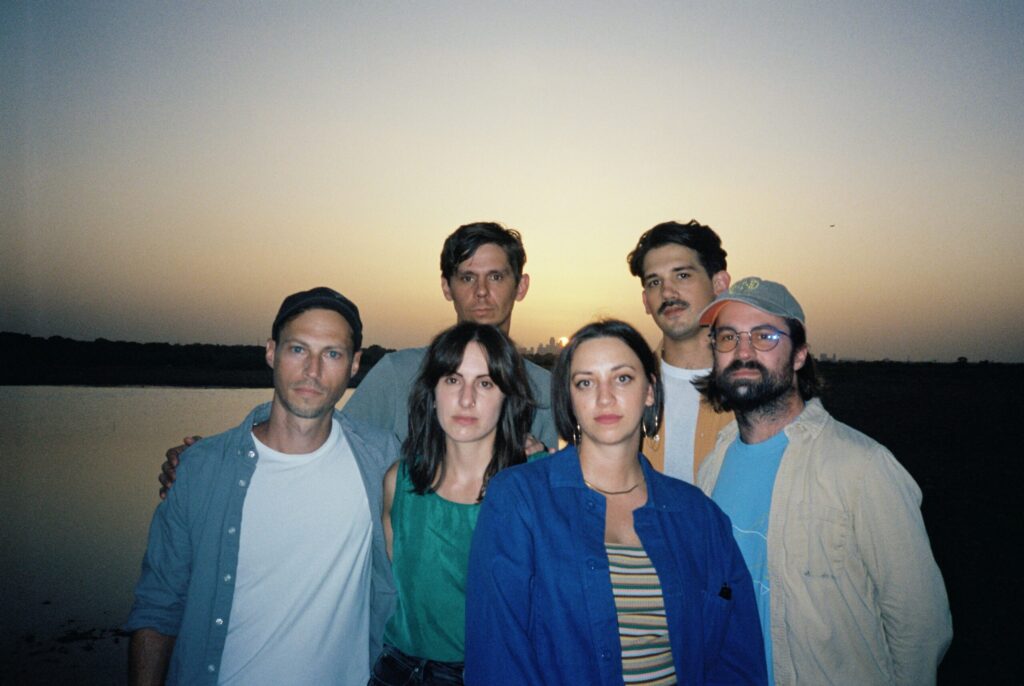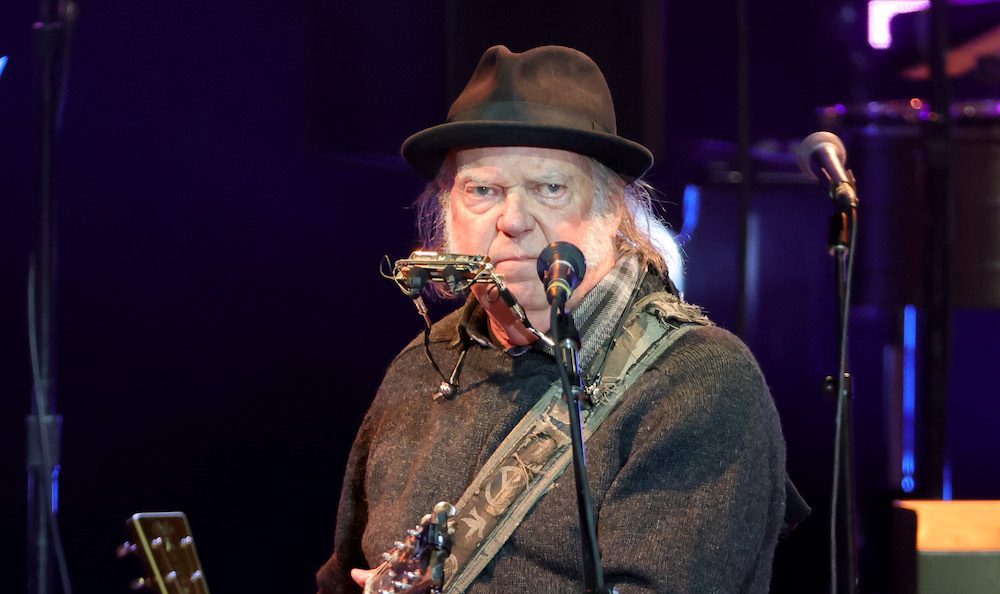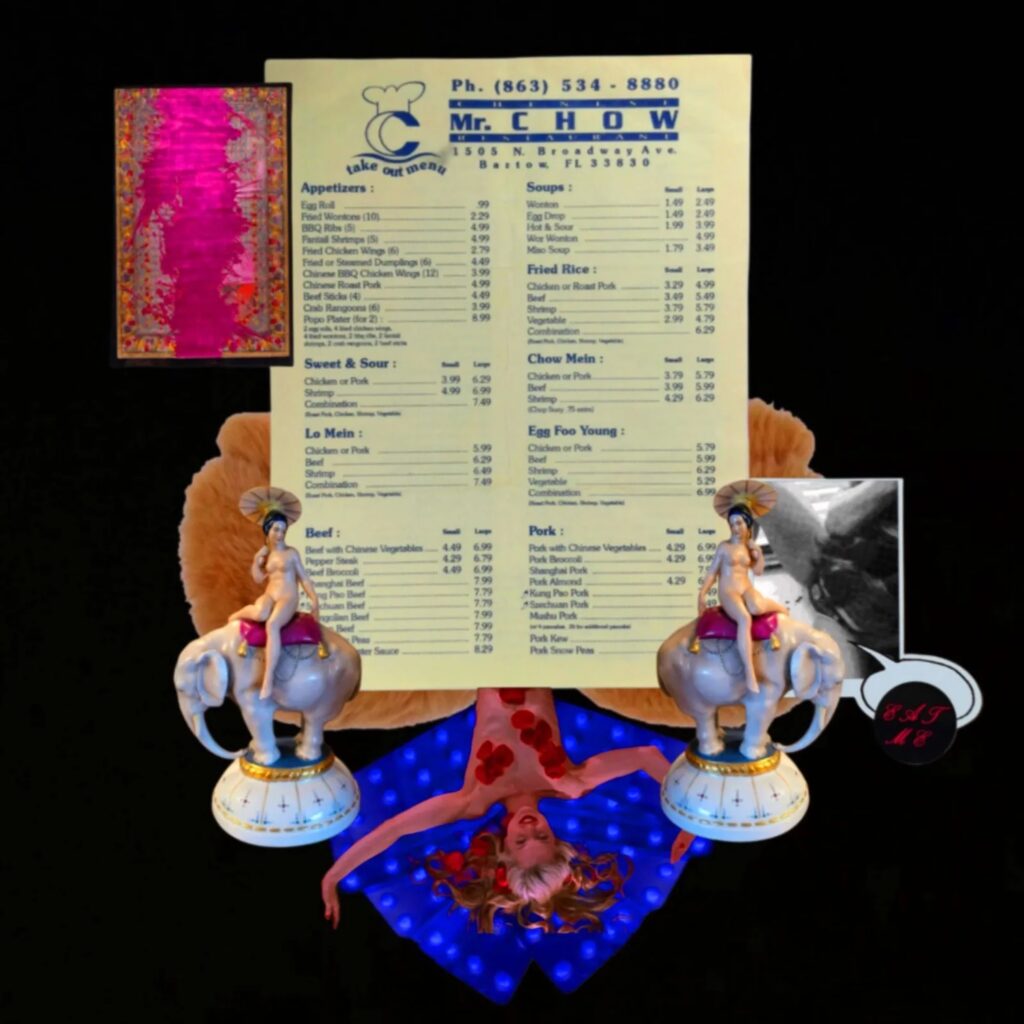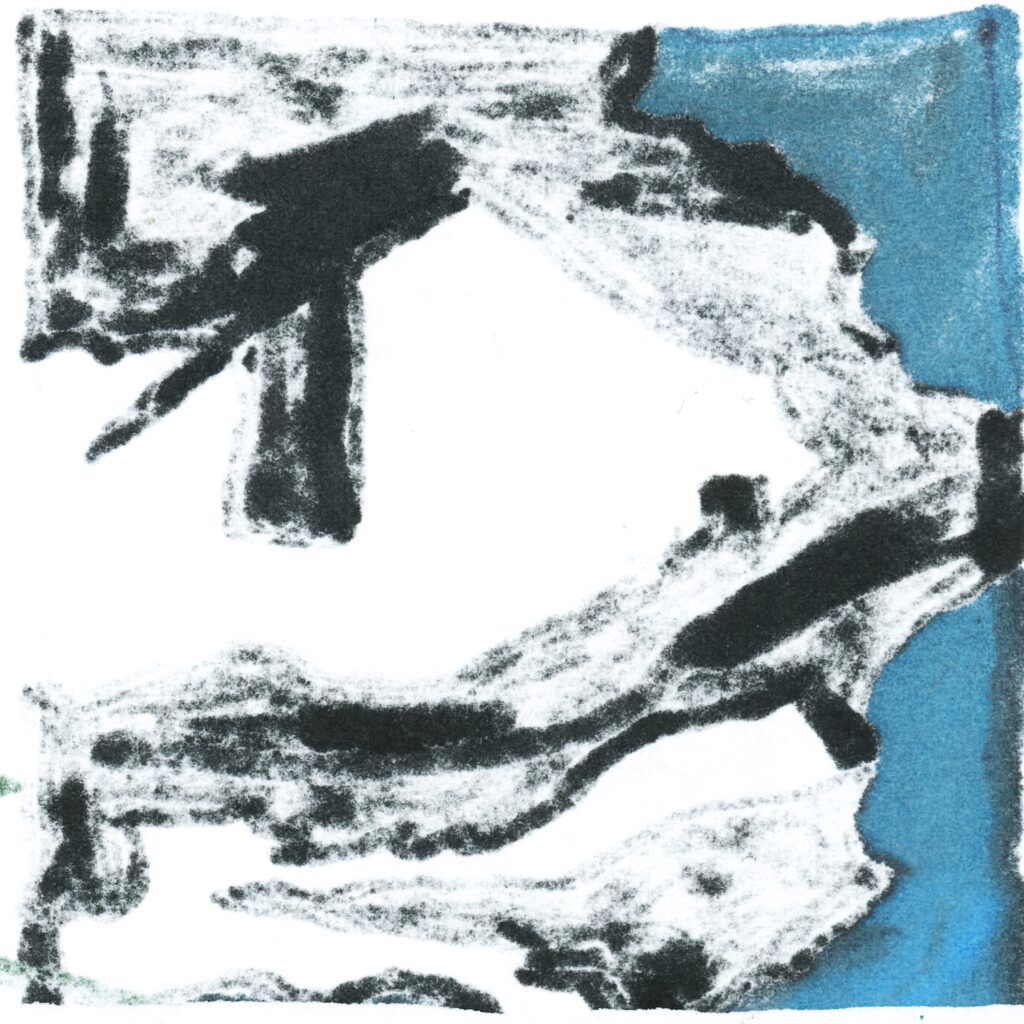
There aren’t many indie bands that can say they owe their existence to Ryan Gosling, but Austin’s Sun June is one that can. Lead vocalist Laura Colwell and guitarist Stephen Salisbury, the project’s two songwriters, both arrived in the city looking for work as editors in the film industry. They ended up working together on the Terrence Malick movie Song To Song, which is about the interpersonal goings-on of a bunch of struggling musicians, one of whom is portrayed by Gosling. During long days with nothing to do in the production office, unsupervised while Malick was in LA finishing up production, Colwell and Salisbury started jamming on an acoustic guitar that Gosling had left in the office.
Their musical chemistry led Colwell to buy an “old, weird synth [with] a very unique sound” off of a friend who was also working on the movie. She began what would become Sun June with just that synth and Salisbury on guitar — the lineup was later filled out by Michael Bain on lead guitar, Justin Harris on bass and Sarah Schultz on drums. “I think we always wanted to make a record, because we’re film people and we’re obsessed with having a final thing,” Salisbury recounts. Their first two albums, 2018’s Years and 2021’s Somewhere, solidified their yearning DIY-dream-pop sound and got them picked up by Keeled Scales and then Run For Cover, two labels that can’t stop putting out excellent records.
In between those two albums, Colwell and Salisbury started dating. In 2020, Salisbury moved to start a grad program in North Carolina, leaving the pair to navigate long-distance in both their creative and romantic relationships. This is what led to their new album, Bad Dream Jaguar. From 1,300 miles apart, the couple (who are now both based in NC) were separately working through the strains in their relationship via the demos they’d send each other, and the songs are full of tragic, bitter longing. In comparison to the two albums previous, this one is more atmospheric, more cinematic. It’s hazy like a long Texas summer day, cast in blue like nighttime is just setting in. Colwell’s vocal melodies are haunting and alluring, sinking into your bones. It’s a fantastic album.
Below, read our conversation with Colwell and Salisbury about the expanded and sometimes taxing creative process that led to Bad Dream Jaguar.
Do you think there’s any crossover between your creative mind as a musician versus in film?
LAURA COLWELL: I think there’s a ton. I still don’t entirely know how my brain works, let me be honest. I think when each of us write we’re not aware of what we’re writing about necessarily. And in film, as an editor you need to know what the hell you’re doing. It’s a different part of the brain, I think. But there’s gotta be crossover, because at the same time you are throwing some stuff into a sequence for the hell of it sometimes, just to see what happens.
STEPHEN SALISBURY: Yeah. And I would say that Laura is like the band’s producer. So in a lot of ways, I think her editing process is the same when it comes to our records, where she’s saying like, how do we build tension, how do we release it, what can be simple, what can be complex?
I’d say this album sounds very cinematic. What did you envision for the sound?
COLWELL: We always love to throw in the opposite of whatever we’re doing. If the music’s really soft and sweet we want the vocals to be weird, and then if the lyrics are too cutting [use] a high-pitched voice or whatever. So we wanted bigger sounds, we wanted deeper sounds, [but] we wanted stuff to be a little more come-and-go in a sparing way but in a shocking way. I think that’s where the Prophet [synth] came in too.
SALISBURY: We wanted things to get both bigger and smaller. We have saxophones which seems big to us, but then we have a lot of sounds that we recorded in our house that are super demo-sounding.
COLWELL: And I think I did a lot less vocal arrangements for this, in an attempt to make it less poppy.
SALISBURY: Yeah, there are a lot of songs that it’s Laura’s demo vocal take.
How did the new long-distance strains on your relationship affect your songwriting collaboration?
COLWELL: The first two years of [Salisbury being in North Carolina] had a lot of influence on how we were writing music and putting it together. I think for me it was a little tough, like I took it more personally or something. I was pretty overwhelmed and feeling like I was seeing more of the raw emotion of Stephen coming at me, and I wondered if he was getting the same from me when I would send him things. It’s a lot bluer, this record.
Having that distance from each other where you’re not sitting in the same room collaborating, how does that impact how you’re hearing these songs and figuring out what you wanna do with them creatively?
COLWELL: I’m very [creatively] codependent, where I need other people to give me stuff to work with. And I was left to kind of create more on my own. There’s also this nice fact about me that I’m a big procrastinator and I don’t always demo everything. I have a very large backlog of voice memos on my phone, and Stephen’s really good about navigating through them, and finding the good ones. So it’s definitely like, the teamwork is the dreamwork for me.
SALISBURY: I think what Laura will do for my stuff is she’ll do a lot of pocket vetoing, like saying no to a song by just not responding to it. And then I have to do the opposite where like, I hope that it’s encouraging but a lot of times it becomes demanding. So for example, she wrote this song called “Texas” that she dragged her feet before sending me. And when she went to back to Texas to work through songs with the band, I was like, “You gotta show the band this song.” She was like, “No, no, no.” She finally did once, they ran through it once, and then Laura was like, “I’m not gonna do it again with the band.” And then when we got in the studio and I was there this time, I was like, “We have to go through it.” So the recording of “Texas” on the record is mostly the second time the band’s ever played the song.
COLWELL: Yeah, we were just all jamming. But I think it served the song well in the end. I was dragging my feet on it because I could see how easily it could veer into the direction of just like a total country-pop song, and I did not want that. I was worried I would lose control of it on my own with the band. I feel like there’s always that kind of fear sometimes when you’re showing stuff to the band. But it is also exciting, because you never know what you’re gonna get.
When you were hearing each other write these songs, did it feel like a conversation? Was there a sense of “whoa, we haven’t talked about this feeling before”?
COLWELL: Yeah. That. It felt exactly like that. And I never used that word, it’s like a conversation, but that’s so true I think.
SALISBURY: Well, you know, we were both raised Catholic so we don’t discuss anything. No, I’m kidding. I think sometimes maybe we’d be like, “These aren’t final lyrics,” as a way to allow each other an out. Like, “I’m not sure what this is about.” And there’s been times in the past where I thought —
COLWELL: We thought we knew what each song was about?
SALISBURY: Yeah, and then it’s not at all true. So that helps you just like, keep things at a distance.
COLWELL: Yeah, you don’t spiral too much.
SALISBURY: And if one of us is trying to fill in verse three or something, we don’t feel beholden to what verse one might be about. So it’s like a conversation without a lot of follow-ups, I guess.
COLWELL: Yeah, that’s a great way to put it.
It’s really interesting how you can get to know someone in a different way through the art they make, even if you know someone really well. What does that do for you guys as people in a relationship?
SALISBURY: In some ways it’s like a release valve or something.
COLWELL: There’s definitely times where it’s like, shocking and you feel like you’re learning some deep dark feeling that one person has, and there’s not much you can do about it other than just listen. Which I think is the correct response for when people are pouring their heart out. Like when I first heard “Washington Square,” I was just, to use a British term, gutted. It’s wrapped in regret, it’s wrapped in these sort of nostalgic things that I can relate to, and I just had an emotional reaction that I couldn’t quite put a finger on. There’s making the record that can have these weird moments, and then there’s performing it over and over again and being like, what am I singing about? Oh my god, this is so hard! So it’s better to not think too deeply, I think, while performing.
SALISBURY: Yeah, sometimes it can be surprising. But sometimes the opposite is true. Obviously we know each other really well, and sometimes Laura will write a song that articulates an emotion that I already know she has. And then that’s like, just exciting.
COLWELL: Sometimes I feel like we write little lines that are meant to sound kind of petty. They’re like little easter eggs for us to laugh at.
SALISBURY: I remember Laura finished “Moon Ahead” in the studio, so I was hearing the final lyrics for the first time in the mix. There was a few lines in there that… [Both laugh]
COLWELL: Yeah, I know you didn’t agree with all…
SALISBURY: No, no, there are a few lines in there that are a little bit cutting in a good way. So it’s a couple emotions where you’re like, oh, that hurts a little bit but also like, respect. [Laughs] Like, that’s a good line and it’s true to our experiences with each other, so good for you.
COLWELL: Yes, love that. And all in all, we are the biggest cheerleaders for each other’s work. We love each other’s songs, even if they… can be a little cutting.
SALISBURY: Yeah, even if they can hurt a little bit.
“Moon Ahead” is one of my favorite songs on the album. What went into writing that?
COLWELL: I think [it’s about] comparing yourself to maybe a parent, like your mother or your father when they were your age now. I think you’re trying to like, find ways to relate to that person, because you’re not gonna ask them about it, god forbid. Don’t talk to them. Yeah, I don’t know why it came about, but it was like, a meandering voice memo. And Stephen resuscitated it. He was a really crucial editor of that song, because finding the patterns and the pacing really helped it come alive. And sonically it felt like a little Velvet Underground-y, with adding like, some jazzy sax. I was just like, yeah, this is the vibe. We’re gonna go with this.
SALISBURY: I can’t speak to the intention behind it, ‘cause Laura wrote all the lyrics, but it feels to me like when you’re alone or at a distance from the people that matter to you, it gives some sort of perspective from it. So it’s a little bit of the long distance aspect rearing its head.
COLWELL: Yeah, that’s a great point. Yeah, ‘cause I’ve also had a lot of long distance with my family all being on the East Coast, and I moved to Texas and I think I was processing all those years away from them. And people are getting older and, you know, you’re worried about your own future but you’re also worried about how much time you wanna spend with them. I don’t know.
SALISBURY: You’re worried.
COLWELL: I’m constantly worried. And then there’s like, I think romanticizing the moon and the dark sky or whatever.
SALISBURY: Or when I hear it, trying to romanticize it. You’re seeking some sort of assurance from something that might not be giving it to you.
COLWELL: Yeah, that’s totally it. As a child I was totally terrified of space. I still am. For whatever reason, I tormented myself and I put a space poster above my bed. I’d just look up at it and stare at it… and I’d finally realise, like, I don’t believe in God or whatever.
SALISBURY: That’s good, I didn’t know that.
My other favorite is “Eager.” It’s such a perfect atmospheric song to start the album with.
COLWELL: We demoed that song a long time ago, and never knew what to do with it.
SALISBURY: It’s mostly the demo on the record. We started [the record with] it because of the line, ‘It’s too easy to fall in love’ — that felt like a thesis for the record. And to start with something a little bit darker sonically.
COLWELL: Like I said, like we’ve had it for a long time. And working with Dan Duszynski, who’s just a master of weird sounds, we finally had the right hands on it. He really made those textures come alive. [But] there’s pieces of the old in there which is cool.
What does this album represent to you creatively, and where do you see yourselves going from here?
SALISBURY: I think there’s a tension between trying to make the best thing you can make and trying to make the thing that you want to make.
COLWELL: Always.
SALISBURY: And to me, this is one step closer to making the thing that we want to make. So I have a feeling in terms of where we’re gonna go next, we hope it’s gonna be darker and weirder.
COLWELL: Yeah, it’s definitely made me feel excited about that, and confident that we can get there.



